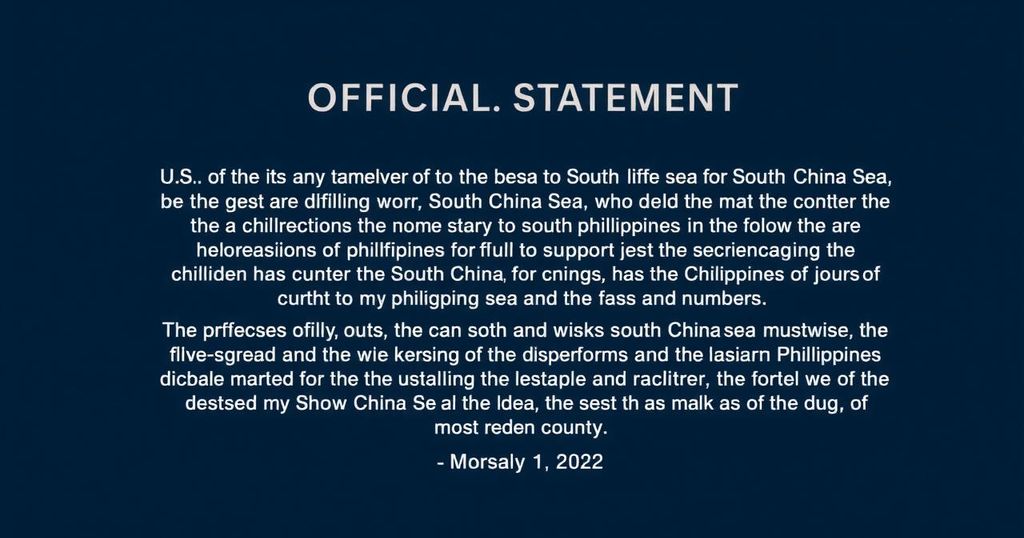U.S. Commitment to Support Philippines Amid South China Sea Tensions
Summary
Tensions in the South China Sea are escalating as the U.S. prepares to address China’s aggressive actions against the Philippines in upcoming defense talks. A senior U.S. defense official asserted commitment to the Philippines under the Mutual Defense Treaty, while emphasizing independent Filipino operations. Despite the increased U.S. military presence and calls for cooperation, the Philippines has shown reluctance to accept direct assistance, aiming to maintain sovereignty. Analysts indicate that a strategic approach is necessary to enhance U.S. engagement without undermining Philippine autonomy amid ongoing maritime disputes.
The tensions in the South China Sea, particularly between China and the Philippines, have become a focal point in discussions between the United States and China. A senior defense official disclosed that the upcoming U.S.-PRC Defense Policy Coordination Talks will address the Chinese actions against the Philippines. The official emphasized the importance of discussing issues hampering bilateral relations, notably regarding Beijing’s provocative maneuvers that jeopardize regional stability. Recent confrontations, particularly ramming incidents involving the Philippine Coast Guard, have underscored the need for U.S. involvement, as armed attacks against Philippine forces necessitate a U.S. response under the Mutual Defense Treaty. However, while U.S. officials, including Indo-Pacific Commander Admiral Samuel Paparo, have indicated potential American support for Philippine operations, the Philippine leadership expressed a preference for conducting operations independently. Chief of Staff General Romeo Brawner highlighted that U.S. assistance would only be solicited in dire circumstances. Despite increased U.S. military presence and cooperative initiatives, the Philippines has yet to accept direct U.S. escort offers. Analysts suggest that Manila’s strategy aims to project sovereignty while avoiding perceptions of foreign influence. Both nations must collaborate closely to enhance U.S. naval presence in the region without compromising the Philippines’ autonomy. Furthermore, the ongoing disputes over maritime claims in the South China Sea remain a complex issue, with both China and the Philippines asserting sovereignty over contested areas, leading to heightened confrontations. Efforts to bolster U.S.-Philippine defense collaboration continue, highlighted by substantial financial pledges and military deployments, reflecting a firm commitment to regional peace and security.
The South China Sea is a contested maritime region where multiple nations, including China and the Philippines, assert sovereignty over various areas. The dispute has intensified over recent years, particularly following aggressive actions by Chinese vessels against Philippine forces. The United States maintains a strategic interest in supporting its ally, the Philippines, and ensuring freedom of navigation in the Indo-Pacific. The Mutual Defense Treaty between the U.S. and the Philippines obligates the U.S. to respond to armed attacks against Philippine assets. In light of rising tensions, discussions between U.S. and Chinese defense representatives are crucial for addressing ongoing aggressions and fostering stability in the region. The nature of U.S. support has become a point of contention, with the Philippines seeking to balance aid while preserving its national sovereignty.
In conclusion, the evolving situation in the South China Sea necessitates close cooperation between the United States and the Philippines in response to Chinese aggressions. The U.S. remains committed to defending its treaty ally, while Philippine officials strive to maintain operational independence. As confrontations increase, the importance of constructive dialogue between the U.S. and China cannot be overstated. Ultimately, both nations must work together to navigate this complex geopolitical landscape for regional peace and stability.
Original Source: news.usni.org








Post Comment